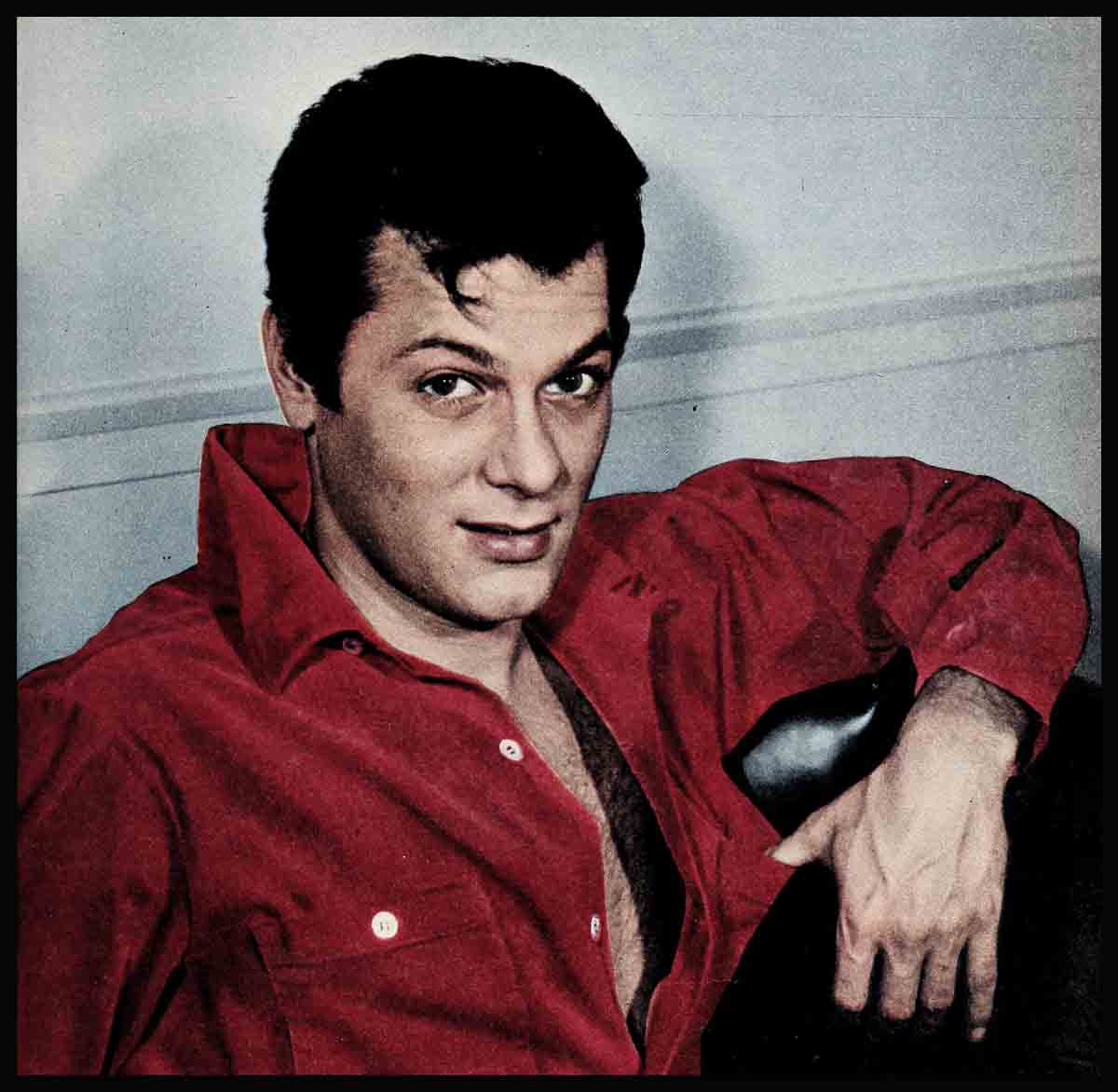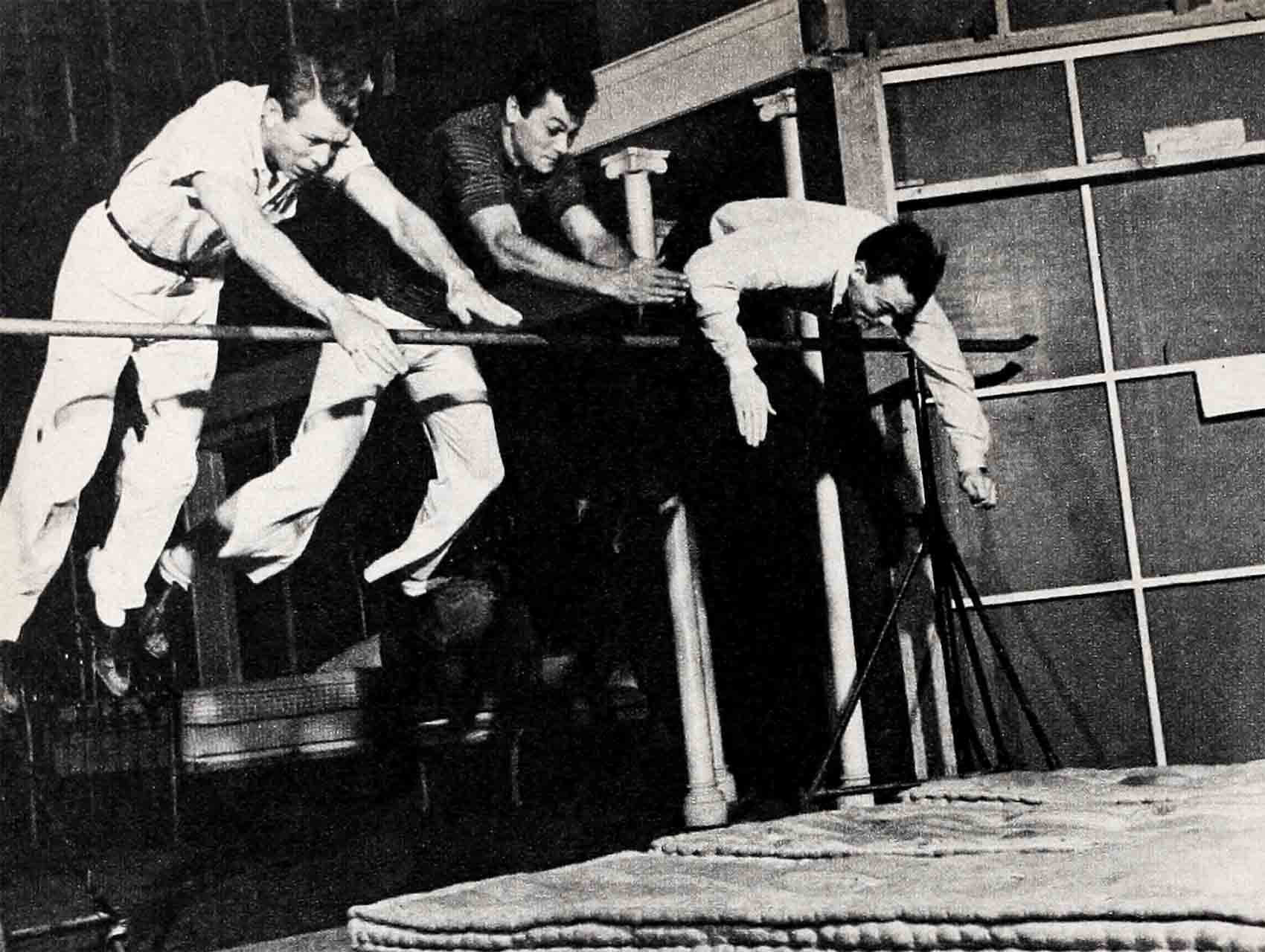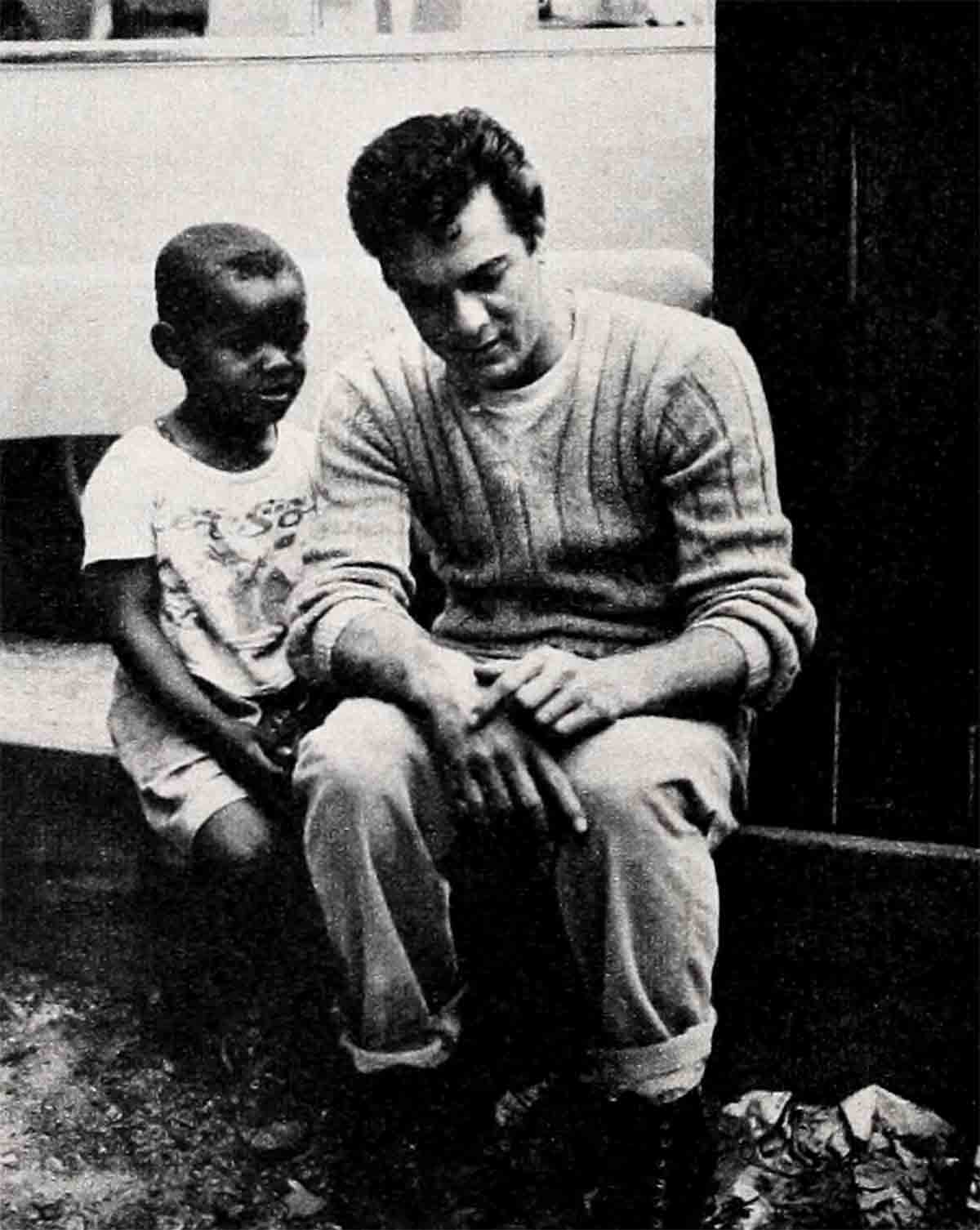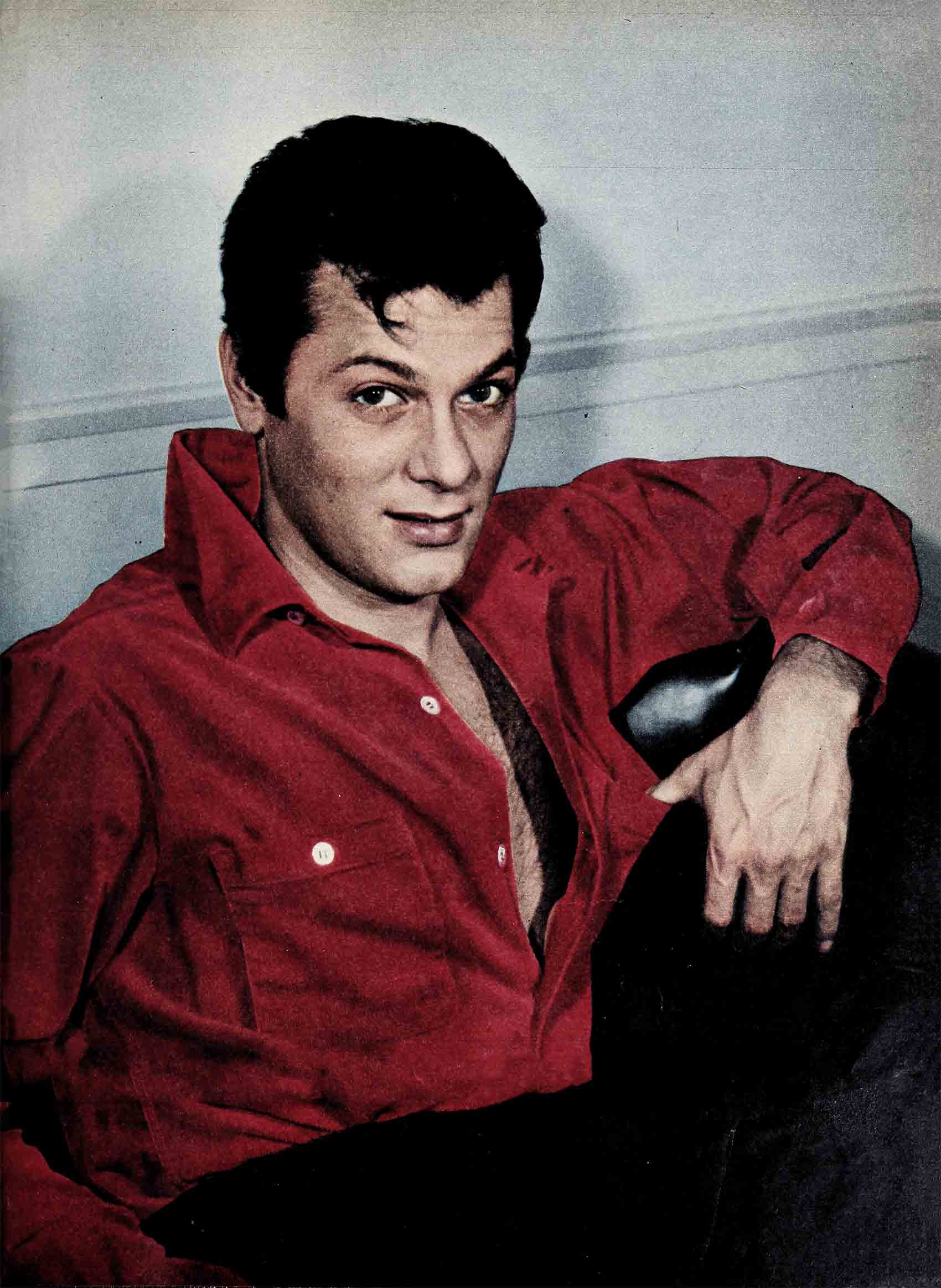
Man Alive—Tony Curtis
Tony Curtis came bounding into the big U-I commissary, took a quick, impulsive leap and landed gracefully with a flourish and deep bow alongside the table where a group of his friends were eating lunch. The flourish and motions were distinctly theatrical and could have been part of a scene from “The Black Shield.”
“Look at that guy,” said Jeff Chandler, who was eating at another table close by. “He gets a tremendous thump out of everything. Such enthusiasm I’ve never seen.”
A round of applause went up and Tony offered a card trick. “See this five of hearts?” he asked, producing the deck with a gallant swish. “I place it in the pack, so, right in the middle; cut three times and there’s your card on top. Good, hey? Now watch this one. . . .”
“Tony’s got the greatest gift of enthusiasm I’ve ever seen,” Jeff said warmly. “Hollywood never gets to be an old story, neither does life. Every day’s a new adventure to Tony. The kid really likes people and the amazing thing is that with all his popularity none of it has spoiled him. He just gets along with everybody. Look at that grin,” Jeff added as Tony walked over to his table, all smiles.
“I’ve got something to show you, Chandler,” he announced dramatically, and then pulling himself up to full height, took out a long envelope from his pocket and waved it under Jeff’s nose. “This’ll prove I’m a success.”
Jeff took the envelope, opened it and drew out a check. “What’s this for?”
“It’s a royalty check, my lad. Remember the record I made with Gloria DeHaven—‘The Two of Us—the song I sang in ‘So This Is Paris’? Well, this is my first royalty check. Get away from me, boy! I can’t associate with you now. This proves who’s the singer in this friendship. Why, the disk jockeys are talkin’ about me with honeyed words.”
“They must be nuts,” Chandler kidded affectionately.
“Aw, Jeff, if you work hard and train your voice, you may have a chance, too,” Tony pretended seriousness and then the verbal barrage of friendly insult began. When Tony finally left, everyone at the table was laughing.

No one is born laughing and to repeat that Tony is just naturally happy would leave psychologists flipping. Happiness like success is earned—it depends upon the individual and it depends upon his experiences. Some people never find happiness. Others, like Tony, are able to recognize and grab it—but who says it’s easy? Today, Tony knows what he’s got—peace and contentment, the ability to laugh and to love. As with his success, he says he’s been lucky. Others have helped him, have shown him the way and he remembers . . .
That late December afternoon in 1933, when a young boy trudged along the traffic-cluttered Second Avenue in New York. City. It had been a gray, sunless day, with a feel of snow in the air and now dusk was enveloping the city, making the tall buildings seem even more forbidding and remote. Often the boy would pause before a lighted shop window and play a timeworn game. He’d pick out those things he’d buy if he had lots of money; then he’d choose those that could be bought with just a little money. Sometimes, if the store was a large one, he’d go inside and pretend he was shopping, just to get warm. Today, he hesitated outside, determining whether he could linger inside unnoticed; then a sharp querulous voice demanded. “Boy, have you got a Christmas present for your mother yet?”
Whirling around, he was half-inclined to run when he saw an elderly woman staring down at him with impatience. “Well, have you?” she demanded sharply.
“Then, here,” she said, thrusting a folded bill into his hand. “See that you do get a present for your mother and don’t spend this money on yourself.” Then, turning, she walked quickly away.
Unbelievingly, the boy looked at the bill clutched in his grimy fist. It was five dollars.
“It was a fortune then,” Tony says now. “And I was too young to stop and wonder why a woman I’d never seen before should give me so much money. But I have thought about it many times since. I know now that it was a simple act of kindness, and I know, too, that kindness must be a part of everyone’s life. To find it, you must recognize that it exists.”

Tony grew up ‘in a weathered tenement in Hell’s Kitchen. His father, Mono Schwartz, had been a well-known actor in Budapest and came to America to make his fortune. Times were hard and when Tony was born, Mono was still struggling to learn English, a drawback which kept him from earning a living on the stage. In time, to support his family, he turned to tailoring. Tony was still a baby when they moved to Manhattan. Here, among sordid surroundings, the boy got his first education in a hard school—on the city streets with the young urchins of the neighborhood. Yet Tony found kindness even here, for as he believes, people, given the chance, are inherently kind.
Like the day that Tony climbed the cement pile. . . .
Next to the tenement in which Tony lived, there was a vacant lot and, in the center of this, surrounded by a clutter of clotheslines where the housewives hung out their washings to dry, was a high, steep-sided mountain of rocks and broken concrete slabs. Like any other adventurous seven-year-old youngster, Tony looked on that rock pile as a challenge.
One afternoon he tried climbing it, and after much scrambling and many near disasters, he reached the top. Sitting there for a time, he contemplated his victory and then started down. Then, in terror, he discovered that it was much easier to climb up than descend. Once he almost toppled over but saved himself by clutching the jagged end of a concrete slab. It cut his fingers and they started to bleed. He gazed anxiously at a leaning telephone pole close by, but the crossarm was beyond his grasp. He began to cry.
Suddenly a window in a nearby tenement building opened and a boy, considerably older than Tony, leaned out and looked at him thoughtfully. A few moments later, he came and stood staring up at the marooned youngster. Then, quite casually, he began climbing the leaning telephone pole which swayed dangerously as he reached the crossarm. Edging his way forward, he leaned out and grasped Tony’s hand, swinging him to safety.
“He held me with one arm while he inched his way down that teetering pole,” Tony said. “Then he set me on my feet, gave me a pat on the shoulder and walked away without a word. I never saw him again, but I’ll never forget that act of kindness. If I were left alone, I would have gotten down somehow, but that boy’s kindness meant a great deal to me—and it still does.”

Tony also remembers a man by the name of Paul Schwartz. He’ll never be able to think of Paul Schwartz without a feeling of fondness and gratitude. For when he was eleven and belonged to one of the toughest gangs in the section, Paul took him from the streets and away from the end that awaited so many of his companions. He took the chip of sullenness off Tony’s shoulder by talking to him in the language of the street, the only language the boy knew. Why did Paul Schwartz do this? “For no other reason than his faith in humanity, his belief in human kindness,” Tony says.
But there were also unkindnesses in Tony’s childhood. Like the woman who owned the apartment which Tony’s folks rented. “I hated her,” Tony admits today. “She put us out in the middle of a period when money for our family was hard to come by. For months I brooded over how I could get even. I realize now that I was too ignorant then to know that hate never helped anybody. Even that woman, I’ll bet, hard and ruthless as she was, must have had some good quality in her if only I knew how to search for it. From her I learned something important after I got a bit older. You can hate qualities in people but you mustn’t hate people themselves, for we’re all dependent on each other. ‘No man is an Island, entire of itself.’ When you realize this, you find humility.
“I found humility as a kid. The first time was when I was running around with a gang of young East Side kids. By that time I had a pretty good opinion of myself. I was a good rough-and-tumble fighter and one of the best pushcart raiders in the district. I had a girl that I kind of liked and she gave me the brush. When she dumped me for another guy, a little bigger and maybe a little tougher than I was, I was bewildered. ‘What did she do that for?’ I kept asking myself. ‘What’s he got?’ It took me a long time to get it through my thick head that no matter how good you think you are, there’s always someone just a little bit better. It taught me humility. To this day, I know that if I ever let my opinion of myself get lopsided, there’ll always be someone around to pin my ears back.”

On the one occasion in Hollywood when Tony needed to have his ears pinned back he was able to do his own pinning. When he first came to Hollywood, Tony was uncertain, sensitive and inclined to be moody. With his immediate success in “The Prince Who Was a Thief,” his studio bosses were a little concerned about him. As Sam Israel, director of publicity for U-I, says, “Some of us thought Tony was becoming aloof, that the initial successes he had might be affecting him adversely, that he was losing his sense of balance and value. We needn’t have worried. Instead of getting a swelled head, Tony was brooding over what he considered his lack of experience. The more he gained confidence, the more cooperative, the more willing he was to exhaust himself in slugging work. Not long ago we had to call off all activity and send him to the desert for a rest. Not even his youth could stand up under the punishment he was taking in riding, fencing, dancing, singing, acting lessons, the interviews and public appearances. His enthusiasm and incredible willingness to slave long hours in perfecting himself is amazing. There’s no better kid in the business than Tony.”
While preparing for his latest picture, “The Rawhide Years,” Tony found he could not ride well. For three weeks he was astride a horse from nine till twelve every day. At the end of that time, he could do running mounts, hang by one leg at a dead gallop and had a bag of tricks that would convince an expert that he’d been saddle-bound for years.
When he was asked to train for a fencing role in “The Purple Mask” he went into it with such fury that Ralph Faulkner, his trainer, says, “Today Tony is one of the finest swordsmen in Hollywood. His sense of timing is remarkable and his muscular coordination perfect. His eagerness to learn was beyond restraint and on one or two occasions carried him beyond the point of safety. Once, lunging forward, he forgot the proper guard and got a severe gash on his cheek. He laughed it off—but he never made that mistake again.”
Pleased but worried about being cast in the musical, “So This Is Paris,” Tony was prepared to reward the confidence placed in him. With Gene Nelson, who coached him, he dedicated all spare time to dancing lessons. “Tony started out by knowing absolutely zero about stage dancing,” says Gene, “but before we were through he could perform with the best. He has an instinctive sense of rhythm and timing—two things that are gifts of God. Without them, no matter how hard you work, you’re sunk. But Tony never took advantage of these talents, he worked twice as hard to develop them.”
Tony’s sense of duty continues to keep him going at a fast pace. “Why shouldn’t I work hard for people who’ve held out a hand to me at every turn?” he asks. “From the first morning I stepped on the lot even the policeman at the gate gave me a big smile and said, ‘Welcome.’ You don’t forget such things.”
Neither can Tony forget that he wants to repay in some small way the kindnesses shown him by holding out a helping hand himself whenever he can. But when pressed to talk about such instances, he shyly begs off with, “I’d a lot rather talk about those who’ve helped me.”
One instance he will discuss though, with some pride, is how he helped a boy get started and what a good job the kid did.
“Harry was struggling along but without much luck,” he explained. “He was a wonderful guy but simply couldn’t get the breaks. I’d been in Hollywood getting my feet planted, but when I returned to New York for a brief visit, I found Harry sunk in despair. I brought him back to California and introduced him to a few casting directors. They clammed up. Right then and there I learned a truism: ‘If you want to get something, go to the head man.’
“I finally sought out the producer and director of the film I was then making, which was ‘Flesh and Fury.’ They were terrific. They gave Harry a test and assigned him a small part as my kid brother in the picture. He came through beautifully and I got a terrific lift out of his success. You know, I realized that true happiness comes in proportion to the good you’re able to do for others. For days after, I walked around with a warm glow. I thought I was helping Harry, which I was, but I did a lot more for myself when I got Harry that break.
“Sometimes you can try to help people and bungle it by letting your ego get in the way. This happened to me once. There was another young actor in New York—let’s call him Al. Things hadn’t been going well with him and he came and asked me if I could help him get a spot in a show. I was lucky and found him one—this was after I’d got going pretty well in Hollywood—and for a while Al did all right. But when the show folded he couldn’t get on again and I heard he was going around putting the rap on me, saying the only reason I was on top was I had the gift of gab and got all the breaks. I kept my mouth shut and didn’t say anything. Then one day he braced me again.
“ ‘Look, Tone,’ he said, ‘I’m in a spot. Could you maybe say a word in the right place?’
“So again, through sheer luck, I was able to help him land a part in a new TV show. Later I saw him in it and thought he was pretty good.
“Well, when that program was finished, he was right back behind the eight ball again, and once again I heard he was knifing me. This time I burned, but I didn’t put the finger on him—more because I was too busy than for any other reason, I guess. But one night I met him at a party.
“ ‘Tone,’ he said, ‘I just can’t get going. Do you know of anything—’
“I blew up before he had a chance to finish. ‘Look, you so-and-so,’ I said burning. ‘You’re loaded with nerve if nothing else. Here you’ve been trying to give me the business among my friends and now you want me to help you again. Get out of my sight.’
“That was the most unfortunate speech I ever made,” Tony said regretfully. “I should have realized that Al had to do something to bolster his own pride and self-esteem. Failure is an awful thing. It’s only human to look for someone else to be the scapegoat. If our situations had been reversed, you know, I might have been just as weak. What I said hurt me a lot more than it did him. For weeks I couldn’t throw off a feeling of having acted small.
“There was another time I acted selfishly and I still can’t think about it without a pang of regret. It was a sweltering day and my young brother, who’s now dead, and I were playing in Central Park. We were thirsty so we went looking for a water fountain. We finally found one but there was a whole crowd of people waiting their turns. Finally my turn came up, but a grumpy old man impatiently pushed me aside before I was finished. I found a paper cup that was lying beside the fountain so I filled it up with the drippings. As I turned away, my brother, m was too small to shove his way to the fountain, thought I got the drink for him. He held out his hand, but instead of giving it to him I drank the water myself. Not long afterward my brother died. It was too late then to be thoughtful and I vowed, if I had the opportunity, I’d never pass up a chance to lend a helping hand again.
And Tony has kept his promise. . .
Recently, a publicity man at U-I told of seeing Tony rush up and give a delivery boy a hand with a huge coffee tank which he was trying to lift from the delivery truck. The tank was heavy and the youngster, lacking a helper, was having difficulty in handling it. Tony grasped one side and together they wrestled the urn onto its stand. “A lot of other actors were standing around, but it never occurred to one of them to help,” the studio man said. “Tony didn’t wait to be asked.”
Tony’s genuine warmth and liking of people has no racial barrier. While making “The Purple Mask,” a publicity representative said, “Tony noticed a Negro boy extra who was standing around between scenes, looking lonely. He went over and talked with him; after that, during the breaks, Tony made it a point to bring the boy into the conversation and the between-shooting bantering in an easy, casual and friendly way.
As Jose Ferrer says, “Tony has the greatest sense of responsibility to his fellow man I’ve ever encountered.”
And the George Washington Carver Memorial Institute has confirmed this. For a few months ago, Tony Curtis was named by this Institute for the annual Award of Merit, given for outstanding contributions to interracial unity. Dr. Robert D. Hobday, the Institute’s president, announced that the award was being made “for the actor’s assistance in the organization of Carver Youth Clubs to combat juvenile delinquency and for his active sponsorship of education libraries in Negro schools.”
Tony accepted the award with gratitude, saying later, “How lucky I’ve been. Without the help of many people, life for me would not have turned out so well. Almost invariably everyone has been kind. I’ve met genuine good will everywhere.”
And to Tony, from his thousands of fans, his hundreds of co-workers and from the many acquaintances and friends he’s made since he moved to Hollywood, comes a warm feeling of gratitude, for we, too, feel, how lucky we are.
THE END
BY HYATT DOWNING
It is a quote. PHOTOPLAY MAGAZINE MAY 1955




